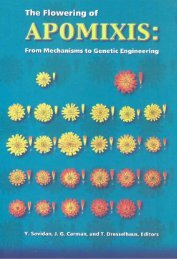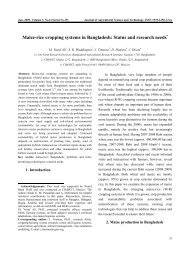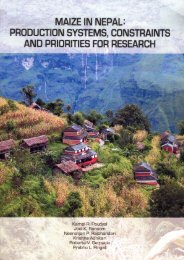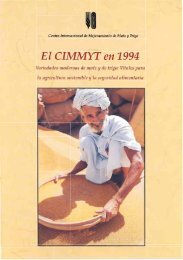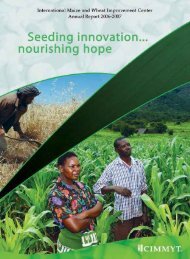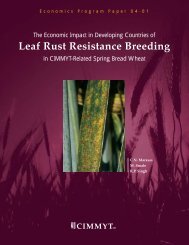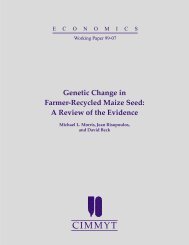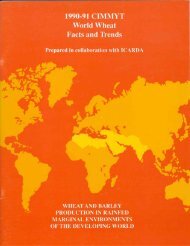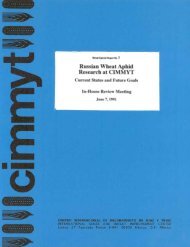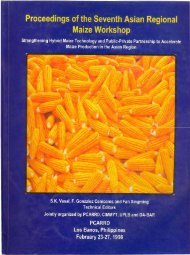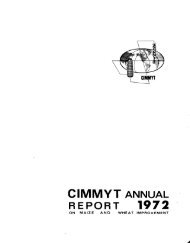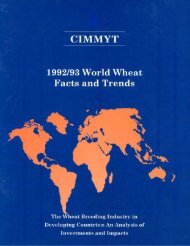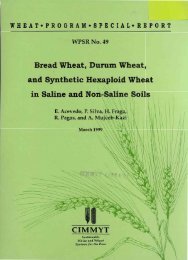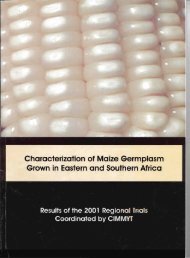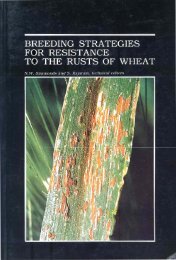the Symposium on Wheats for More Tropical Environments - cimmyt
the Symposium on Wheats for More Tropical Environments - cimmyt
the Symposium on Wheats for More Tropical Environments - cimmyt
- No tags were found...
Create successful ePaper yourself
Turn your PDF publications into a flip-book with our unique Google optimized e-Paper software.
311Finally. it should be clarified that. inmany tropical countries. low breadprices have produced few benefits to<str<strong>on</strong>g>the</str<strong>on</strong>g> poor. Ra<str<strong>on</strong>g>the</str<strong>on</strong>g>r. <str<strong>on</strong>g>the</str<strong>on</strong>g> middle and upperincome groups. which are <str<strong>on</strong>g>the</str<strong>on</strong>g> mainbread c<strong>on</strong>sumers. have captured <str<strong>on</strong>g>the</str<strong>on</strong>g>benefit of <str<strong>on</strong>g>the</str<strong>on</strong>g>se policies. while <str<strong>on</strong>g>the</str<strong>on</strong>g>farmer. especially <str<strong>on</strong>g>the</str<strong>on</strong>g> small farmer whoproduces local staples such as maize.has been <str<strong>on</strong>g>the</str<strong>on</strong>g> main loser (5.14.16).Policies toward <str<strong>on</strong>g>the</str<strong>on</strong>g>wheat processing sectorAn integrated wheat strategy shouldcarefully rati<strong>on</strong>alize investments inwheat processing. especially large-scalecapital and <strong>for</strong>eign exchange-intensivemilling and baking plants. Littlejustificati<strong>on</strong> is found <strong>for</strong> <str<strong>on</strong>g>the</str<strong>on</strong>g>establishment of a milling industry.given <str<strong>on</strong>g>the</str<strong>on</strong>g> need to efficiently use scarcecapital and promote employment.Removal of tariff protecti<strong>on</strong> <strong>on</strong> flourimports should effectively arrest <str<strong>on</strong>g>the</str<strong>on</strong>g>growth of this industry. until such timeas local wheat producti<strong>on</strong> might beestablished. Importing wheat as flourmaintains much greater flexibility infuture food-policy decisi<strong>on</strong>s and alsoreduces <str<strong>on</strong>g>the</str<strong>on</strong>g> power of <strong>on</strong>e of <str<strong>on</strong>g>the</str<strong>on</strong>g>str<strong>on</strong>gest voices. that of <str<strong>on</strong>g>the</str<strong>on</strong>g> millers. infood-import policy. Finally. mosttropical countries produce white flour.milled at an extracti<strong>on</strong> rate of 70 to75%. Legally mandated higherextracti<strong>on</strong> rates (e.g.. in Sudan). whichproduce off-white flour and breads.would allow saVings in wheat imports.Import policy and food aidWe have noted that cereal imports by<str<strong>on</strong>g>the</str<strong>on</strong>g> tropical countries have emphasizedwheat and. to a lesser extent. rice.Maize imports have largely beendestined <strong>for</strong> feeding livestock. Yet maizeis usually <str<strong>on</strong>g>the</str<strong>on</strong>g> cheapest cereal in worldmarkets. and is a staple food of mosttropical countries. especially <strong>for</strong> <str<strong>on</strong>g>the</str<strong>on</strong>g>poor. With c<strong>on</strong>sumer prices that reflectimport prices. maize has c<strong>on</strong>siderablepotential as a food import. Somedifficulties arise because most countriesc<strong>on</strong>sume white maize. while yellowmaize dominates world markets. Yet.with <str<strong>on</strong>g>the</str<strong>on</strong>g> favorable price incentives andexport promoti<strong>on</strong> seen <strong>for</strong> wheat. <str<strong>on</strong>g>the</str<strong>on</strong>g>reshould be no reas<strong>on</strong> why maize cannotplay an important role in world foodtrade. D<strong>on</strong>or agencies could help bytargeting food aid to countries inaccordance with <str<strong>on</strong>g>the</str<strong>on</strong>g>ir staple food. Fortropical countries. thiS would meanmore emphasis <strong>on</strong> food aid in rice andcoarse grains.Promoti<strong>on</strong> of c<strong>on</strong>veniencefoods based <strong>on</strong> local food staplesBread-making technology has largelybeen imported from <str<strong>on</strong>g>the</str<strong>on</strong>g> industrializedcountries. At <str<strong>on</strong>g>the</str<strong>on</strong>g> same time, untilrecently. little research has beenc<strong>on</strong>ducted <strong>on</strong> <str<strong>on</strong>g>the</str<strong>on</strong>g> preparati<strong>on</strong> of localfoods to meet <str<strong>on</strong>g>the</str<strong>on</strong>g> preferences andc<strong>on</strong>venience needs of urban c<strong>on</strong>sumers.There has been c<strong>on</strong>siderable research<strong>on</strong> composite flours which mix wheatflour with maize. millet or cassava flour<strong>for</strong> bread making (11,17). This appearsto be technically feasible. but <str<strong>on</strong>g>the</str<strong>on</strong>g>greatest obstacle in most countries isthat pricing policy favors wheat flourand prOVides no incentives to usemixtures.Meanwhile. private and public agenciesof wheat-exporting countries havec<strong>on</strong>ducted Vigorous and apparentlysuccessful market-promoti<strong>on</strong> programs<strong>for</strong> wheat products. Government policyshould c<strong>on</strong>vert <str<strong>on</strong>g>the</str<strong>on</strong>g>se ef<strong>for</strong>ts into <str<strong>on</strong>g>the</str<strong>on</strong>g>nati<strong>on</strong>al interest. perhaps by requiringthat <str<strong>on</strong>g>the</str<strong>on</strong>g>se export interest groupsc<strong>on</strong>duct research and promoti<strong>on</strong> thatbalances wheat with local food staples.Increasing domesticagricultural producti<strong>on</strong>In an integrated wheat strategy.increased agricultural producti<strong>on</strong> mustreceive high priority. Producing wheatdomestically is <strong>on</strong>ly <strong>on</strong>e opti<strong>on</strong>.Alternatives include 1) promoti<strong>on</strong> of



